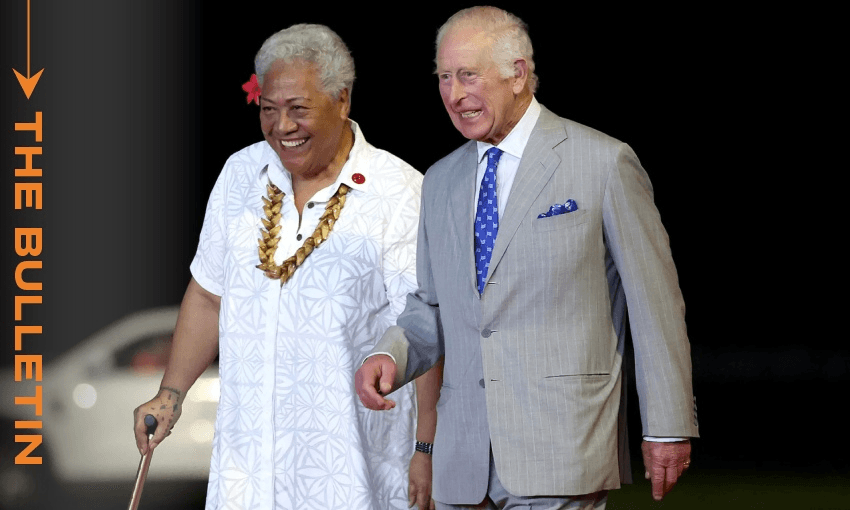Climate change, Commonwealth power, slavery reparations and the small matter of our naval shipwreck will be on the agenda as leaders gather in Samoa, writes Anna Rawhiti-Connell in this extract from The Bulletin.
To receive The Bulletin in full each weekday, sign up here.
Luxon and Peters head to Samoa
Prime minister Christopher Luxon and foreign affairs minister Winston Peters land in Samoa today for the Commonwealth Heads of Government meeting (CHOGM). Despite reports from locals about the smell of diesel and oily fish after the sinking of the HMNZS Manawanui off the southern coast of Samoa, Luxon says the saga won’t overshadow the CHOGM event “at all”. “The reality is, it [the Manawanui] is not proving to be a burden on Samoa and its delivery of CHOGM at all. We have done everything we can to lean in to make sure Samoa has a very successful CHOGM, and the Manawanui piece is compartmentalised very well,” he said. As Newstalk’s Jason Walls reports, Luxon’s first stop when he lands in Samoa will be to Manawanui Interagency task force, which has set up off the coast of the wreckage.
Defence minister Judith Collins has also cast doubts on the 200,000 litre figure given by Samoan authorities, saying it was likely much less. All three containers that came off the ship have been removed from the reef. As Sharon Brettkelly reports for The Detail, work to remove the fuel should start in the next few weeks, but the boat itself is unlikely to be salvaged until mid next year.
Commonwealth risks ‘withering on the vine’
This is the first time CHOGM has been hosted by a Pacific island country. King Charles and Queen Camilla landed in Samoa last night. The king will address the Commonwealth leaders and is expected to focus on climate change. RNZ’s Susana Suisuiki outlines what else we can expect from the biennial gathering.
Lord Jonathan Marland, the chair of the Commonwealth Enterprise and Business Forum, has already called for a Commonwealth free trade deal between the 56 member nations. As Brettkelly reports, without it, he says, the Commonwealth risks withering on the vine unless it finds real things that people can benefit from.
King’s visit to Australia dominated by senator’s interruption
The King arrives after a trip to Australia. While you must admire the alpaca that sneezed on King Charles for having a fair crack at grabbing headlines, the King’s visit was largely dominated by headlines about Senator Lidia Thorpe’s interruption of the royal reception at Parliament House. Thorpe called for a treaty and yelled “you are not our king” before she was forced to leave. Australian opposition leader Peter Dutton has called for Thorpe to resign. Writing for the Guardian, Celeste Liddle says that Thorpe’s outburst would not have been a shock if Australians knew the whole truth about Indigenous history.
British prime minister, Sir Keir Starmer, is batting away a push from Caricom, a group of 15 Caribbean countries, to discuss slavery reparations at CHOGM. Starmer says he wants to “look forward” rather than have “very long endless discussions about reparations on the past”.
More than half of New Zealanders think we should keep a British monarch
As is now contemporary custom, a monarch’s visit to (or near to) a Commonwealth outcrop inspires debate about not having a monarch. In new research commissioned by New Zealand Republic, more than half of New Zealanders think a British monarch should remain as our head of state. In Australia, in response to a letter sent by the Australian Republic Movement, King Charles indicated he would not stand in the way if Australia wished to become a republic. Prime minister Anthony Albanese appointed one of his MPs as assistant minister for the republic not long after he was elected but has recently indicated that a second referendum was not a priority. The assistant ministry was abolished in July.
As we know, quoting our former prime minister and our current one, New Zealand is expected to become a republic one day, just not on anyone in particular’s watch.


